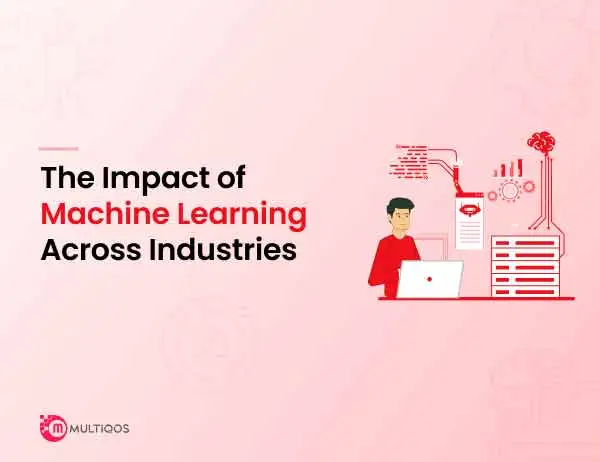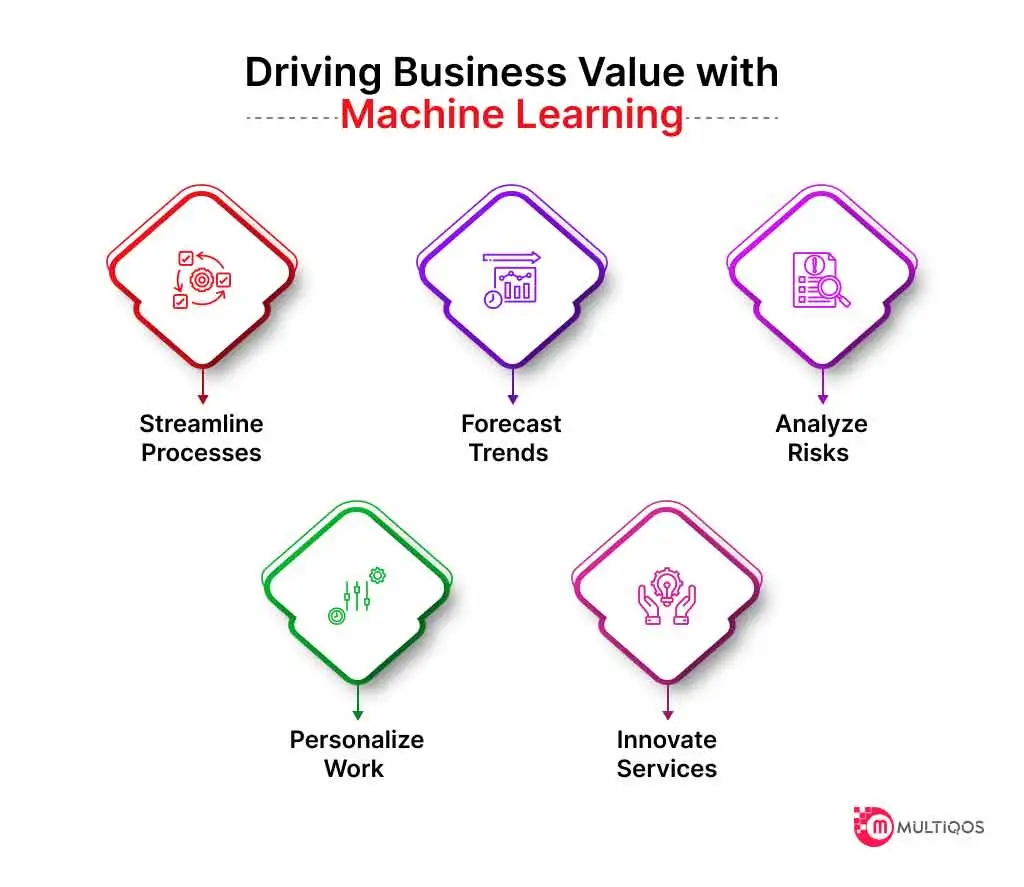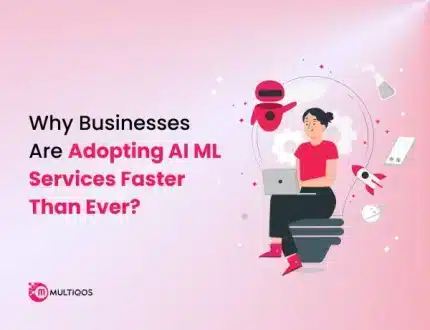
Machine learning (ML) is rapidly changing how businesses operate across the globe. ML allows companies to make choices based on data instead of guesses. It also helps automate complicated tasks and drive new ideas.
As the world relies more on data, being able to use machine learning well is becoming a key way for businesses to get ahead of competitors. Whether a company is big or small, and no matter what industry it’s in, machine learning skills are very valuable.
According to a recent report by Rackspace Technology, nearly a third of IT professionals worldwide only began their AI and ML journey in the past year, highlighting the growing recognition of the value and potential of these technologies. Nowadays, many companies are using machine learning technology for various purposes.
Machine learning helps businesses in several ways, makes operations more efficient and cuts costs. Machine learning also improves customer experiences. It even allows companies to create new business models.
Machine learning works by creating algorithms and models that learn from data. These systems study data to make accurate predictions or decisions. They don’t need people to program instructions for every task.
Machine learning is very useful for many applications. It can detect fraud, predict when machines need repair, give personalized recommendations, and diagnose diseases. Companies are adopting machine learning because of these great benefits.
The Disruptive Potential of Machine Learning Across Industries
Companies need to be innovative to remain competitive and satisfy customers’ changing needs. They’re using machine learning (ML) to discover new possibilities and modernize their operations.
With ML, businesses can study huge amounts of data quickly. They can spot patterns that humans might miss. ML algorithms can analyze customer data to understand buying habits. This lets companies personalize products and marketing. In manufacturing, ML monitors production to reduce defects and waste. It can also optimize processes to boost efficiency.
Here are some major examples of how ML impacts and transforms different industries
1. Manufacturing
The manufacturing sector is at the forefront of ML adoption, with 18.88% of manufacturers having integrated ML solutions as of 2023, according to Statista. Machine learning is being used in this industry to:
- Detect anomalies and predict equipment failures, reducing downtime and maintenance costs.
- Automate quality control processes, improving efficiency and product quality.
- Optimize production lines and adapt equipment to changing requirements.
- Enable mass customization of products based on customer preferences.
Many businesses, including Bosch, have established bold objectives to utilize artificial intelligence (AI) or entirely AI-driven processes in the production of all their offerings by the year 2025. This clear commitment demonstrates the manufacturing sector’s dedication to using the power of machine learning (ML) technologies to gain a competitive edge over rivals. Companies recognize the immense capabilities of AI and ML to streamline operations, enhance efficiency, and drive innovation.
2. Financial Services
The financial services industry is rapidly adapting machine learning to streamline operations, mitigate risks, and enhance customer experiences. ML applications in this sector include:
- Personalized financial services and targeted offers based on customer behavior analysis.
- Automated credit approval processes and loan underwriting.
- Fraud detection and anti-money laundering monitoring.
- Investment portfolio optimization and algorithmic trading.
Leading institutions like Wells Fargo and Standard Chartered Bank are using ML to automate manual processes, detect fraud, and deliver personalized services, demonstrating the strategic value of these technologies in the financial sector.
3. Healthcare
The healthcare industry is using the power of machine learning to improve patient outcomes, enhance diagnostic accuracy, and streamline operations. Key ML use cases in this domain include:
- Medical image analysis for early disease detection and diagnosis.
- Precision medicine and personalized treatment plans based on patient data.
- Drug discovery and development acceleration.
- Predictive analytics for disease risk assessments and preventive care.
Scientists from Cambridge University created a machine learning system that examines brain MRI scans. This innovative tool can predict if someone will develop Alzheimer’s disease before any signs or symptoms appear. Early detection allows for timely interventions and treatments to begin, improving patient outcomes.
4. Retail
In today’s fiercely competitive retail market, machine learning technology offers businesses a powerful advantage. Companies now use ML to elevate customer service and streamline operational efficiency. Some key applications of machine learning within the retail sector include:
- Personalized product recommendations based on customer preferences and behavior.
- Inventory management and demand forecasting using predictive analytics.
- Pricing optimization and dynamic pricing strategies.
- Customer segmentation and targeted marketing campaigns.
Machine learning technologies have proven to be incredibly versatile across various industries. In the real estate sector, companies like Zillow and HouseCanary are utilizing ML to provide personalized home recommendations tailored to individual preferences and needs. These algorithms analyze user data and property details to suggest listings that align with the desired location, size, amenities, and budget.
Driving Business Value with Machine Learning
The adoption of machine learning is being driven by a multitude of factors, major among which are the potential benefits and value it can deliver to organizations. The top reasons businesses choose ML include:
1. Improving speed and efficiency of existing business processes
Machine learning streamlines work by automating repetitive tasks. Models find inefficient areas and reallocate resources effectively. Data analysis enables smart choices, cutting costs and enhancing output. Workflows become sleeker, productivity soars. Simple routines can be automated, and complex processes can be optimized using Machine Learning (ML).
2. Predicting business performance and industry trends
Machine learning excels at analyzing large datasets and identifying patterns that can be used to forecast future trends and business performance. This capability is invaluable for strategic planning, risk mitigation, and capitalizing on emerging market opportunities.
3. Reducing business risks by analyzing simulated situations
ML models can be trained on synthetic or historical data to simulate various scenarios and identify possible risks or vulnerabilities. This proactive approach allows organizations to take preventive measures and mitigate risks before they materialize, minimizing possible losses and disruptions.
4. Enhancing personalization in the work environment
Machine learning allows companies to examine employee info, opinions, and preferences. This analysis helps organizations make workplaces and policies suited to their employees’ needs and wants. Doing this can result in happier workers, higher productivity, and keeping good people around.
5. Offering new or altering existing services
Machines are able to detect patterns and insights hidden in data that humans might miss. This allows machine learning to inspire new ideas, products, services, and ways of doing business. The ability to continually adapt and change is very important for companies to stay ahead of their competition in today’s constantly evolving business world.
Machine learning can identify trends and opportunities that would otherwise go unnoticed. By exploring these valuable insights from data, organizations can develop innovative solutions and gain a significant competitive advantage.
Read also: The Impact of AI on Software Development
Overcoming Challenges and Embracing the Future
While the possible benefits of machine learning are significant, its adoption and successful implementation are not without challenges. Organizations must ensure they have access to high-quality and diverse data sets, as well as the necessary computational resources and skilled personnel to develop and deploy ML models effectively.
Moreover, it is crucial to address moral issues regarding data privacy, algorithmic prejudice, and openness to guarantee the accountable and reliable application of machine learning innovations. Continuous checking and assessment of ML models are likewise essential to keep up with their exactness and unwavering quality over a period of time.
Guaranteeing security and straightforwardness in the use of AI frameworks is fundamental for building trust and confidence among partners and end-clients.
Regardless of these difficulties, the eventual fate of machine learning in business is promising and overflowing with possible outcomes. As the innovation keeps on advancing and become more available, its reception is supposed to speed up across enterprises.
Organizations that gladly accept machine learning and incorporate it into their tasks and decision making processes will be better situated to drive development and enhance execution.
Staying up with the latest and using the most recent ML advancements can give associations an upper hand by empowering them to settle on more educated and information driven choices, work on productivity, and customize client interactions.
Machine learning is already changing the world today. It helps businesses get better at what they do. Machine learning is being used in many different companies and industries like factories, banks, hospitals, and stores. With machine learning, businesses can find new ways to work smarter, get more done, and come up with fresh ideas.
Companies need to use machine learning to stay ahead of their competition. Customers want new and better products and services all the time. Machine learning lets businesses make choices using facts and data instead of just guessing.
Machine learning can do hard jobs automatically without people. Businesses can learn important secrets from data when they use machine learning. These insights help companies plan for the future and grow their profits.
Conclusion
As we move forward in this digital age, incorporating machine learning into our operations can open up a world of possibilities. While the path towards successful implementation may seem daunting at first, the possible rewards are truly remarkable.
Organizations that use this modern technology and effortlessly integrate it into their decision-making processes will undoubtedly gain a significant edge over their competitors.
In today’s ever-evolving world, where data reigns supreme, the ability to use and effectively utilize the vast amounts of information available can mean the difference between thriving and becoming obsolete.
Imagine a future where machine learning algorithms are meticulously designed to analyze and interpret complex data sets, identifying intricate patterns and trends that would be virtually impossible for the human mind to discern. This advanced analytical capability can usher a new area of innovation across industries.
FAQ on Impact of Machine Learning Across Industries
Machine learning is a field of artificial intelligence that allows systems to learn and improve from data without being explicitly programmed.
In our modern world, machine learning offers incredible advantages. It allows businesses to streamline routine tasks through automation. Additionally, it enhances operational procedures by boosting efficiency. Machine learning can also help reduce overhead expenses significantly. Furthermore, it improves customer interactions and experiences.
Machine learning models find use across sectors – detecting fraud in finance, optimizing processes in manufacturing, analyzing medical images for healthcare insights, curating personalized recommendations for retail.
It can be difficult to obtain high-quality data that is clean, accurate, and relevant for machine learning systems. Having sufficient computational power and resources like powerful hardware and cloud computing infrastructure is also challenging. Finding skilled personnel with expertise in machine learning, data science, and programming is not easy.
Successful companies welcome the latest machine learning breakthroughs with open arms. Integrating artificial intelligence helps them make smarter choices and decisions. Using data-driven insights play a huge role in gaining an edge over competitors.
Machine learning shows great potential for businesses, with widespread adoption anticipated soon. ML enables decisions backed by data insights, streamlined processes, tailored customer interactions, along with innovative business models.
Get In Touch







